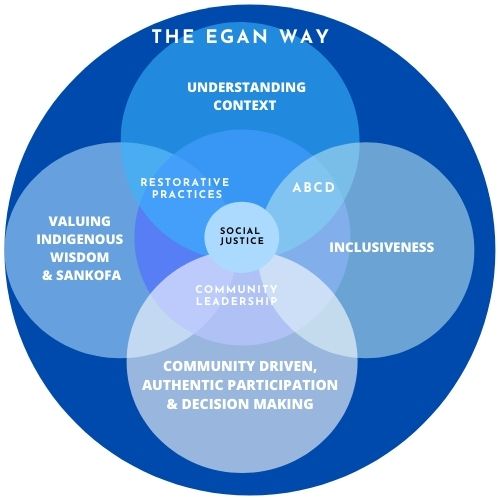Over the years, the Egan Office for UECP has developed a set of principles referred to as “the Egan Way.” Guided by our mission, we use these principles to direct and assess the processes we use to do our work in communities and the outcomes and impact of our collaborative efforts. These principles guide us:
Sustainability: We believe that our efforts in long-term partnerships with communities should lead to sustainable and transformative partnerships, programs, and resources in the service of equity and justice.
Understanding Context: We believe that the social, political, economic, ecological, cultural, historical, gender-based, religious, and other contexts of peoples’ lives are critical to understanding their assets and the goals they wish to achieve.
Systemic Analysis: We think about individuals, organizations, and communities within the context of the internal and external systems that affect them. We work towards individual and social transformation and systemic social, political, and economic policies and practices. We work in partnership with the community to understand the social forces that maintain inequity and challenge social transformation efforts.
Valuing Indigenous Wisdom: We believe that the funds of knowledge* inherent in communities, groups, communities, and cultures are as crucial as knowledge produced in mainstream academic circles. We believe that knowledge should be co-produced with communities. Participatory action research, story-telling, and asset mapping are three important ways to capture indigenous wisdom.
Sankofa: We create opportunities for people to learn from their history –the lessons learned and successes—to move forward and build on what has come before us.
Positionality: We believe that we should constantly be aware of our own relative privilege based on differences in race, class, gender, educational levels, and access to opportunities and resources that others may not have. We believe in using our understanding of positionality to help us understand various responses to oppression without judgment and determine the balance of relative power in our work with communities.
Intersectionality: We believe that all forms of oppression, including those based on race, class, gender, sexuality, religion, nationality, citizenship status, ethnicity, and ability, must be understood and addressed as they intersect in people’s lives, in communities, in societies, and our global reality. Inclusiveness: We work to ensure that all community residents, especially those traditionally non-participatory and unheard, find and use their voices and partake as equal partners and agents of change. Multi-directional learning: We believe that learning should come from multiple sources and multiple perspectives. Learning is a lifelong endeavor that requires the intentional creation of opportunities to integrate dialogue, reflection, and action. We believe that knowledge must be co-created in dialogue among people who directly experience the realities of inequity, injustice, and marginalization.
Critical thinking: We believe that partnerships should be based on a critical analysis of the power structures, inequities, and injustices among partners, communities, and society. We engage in critical thinking identifying all research and perspectives on an issue, whether from academia or informal and nontraditional sources.
Praxis, Reflection, and Action: We create opportunities for ongoing critical reflection about our work in staff meetings, informal dialogue, community forums, town hall meetings, and other convenings. University faculty and students are not neutral observers and researchers but rather partners supporting the efforts of community folks in the process of social transformation.
Community-driven: We believe that our work with communities must be at their invitation and must be driven by community folks who take ownership of the assets, the knowledge they develop, and the actions they undertake.
Authentic Relationships, participation, and decision making: We believe that relationships are at the heart of our work. We recognize that relationship-building needs to be intentional and requires an investment of time and self. We also believe that differences and conflicts can be resolved within the context of relationships. We value long-term relationships with diverse groups of community residents, organizations, coalitions, action groups, and institutions. We also believe in providing concrete resources and support for the maximum participation of all community folks, especially the disenfranchised, in decision-making processes that affect their lives.
